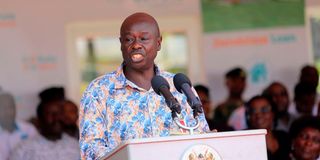Premium
DP Rigathi Gachagua heads to Cuba for G77 summit, Colombia to promote Kenyan coffee

Deputy President Rigathi Gachagua addressing a crowd at the 2023 Agriculture Society of Kenya International Show in Mombasa on September 7, 2023.
Deputy President Rigathi Gachagua will prioritise the marketing of Kenyan coffee during his tour of Colombia as Kenya positions itself among the world's top speciality coffee producers, his office has said.
The DP leaves for the South American country today on a week-long official visit that will also see him lead the Kenyan delegation to the G77 - a coalition of 134 developing countries including China - summit in tCuban capital Havana.
The DP will address the G77 summit on behalf of President William Ruto.
The DP delegation comprises coffee farmers from the main coffee growing counties in the Mt Kenya region including Nyeri, Kiambu, Muranga and Kirinyaga.
The farmers will participate in the Coffee Producers and Roasters Forum (PRF) in Medellin, as well as meet with leading coffee producers and traders in the Latin American country.
Colombia is a world leader in speciality coffee, producing and exporting to high value markets such as the US, Germany and Belgium, which Kenya is also targeting through value addition. Colombia produces about 12 percent of the world's coffee, making it the third-largest producer in the world.
Mr Gachagua's visit to Colombia is part of President Ruto's mandate to his deputy to spearhead reforms in the agricultural sector.
The DP is expected to use the opportunity to lobby for support for Kenya's bid to host the inaugural Africa Coffee Producers and Roasters Forum next year.
The visit is crucial for the farmers as they will learn best coffee practices from the world's leading coffee farmers in Chinchina and visit a coffee research facility.
"The coffee sub-sector reforms that the government is spearheading are aimed at eliminating middlemen and brokers. We want to connect our farmers to the market," said the DP.
He added: "The visit to Colombia will give farmers the opportunity to engage directly with roasters and this will be a game changer in our coffee production chain. We will stop at nothing until the farmer thrives in profitability."
The farmers' visit is seen by coffee stakeholders as an opportunity for farmers to gain new insights into the latest trends in the global coffee industry.
In May, Colombian Vice President Francia Elena Marques Mina visited Kenya and signed bilateral trade and investment agreements.
The two countries signed a Memorandum of Understanding to establish a Joint Commission for cooperation in several areas, including gender equality and women's empowerment, public diplomacy initiatives to promote Spanish as a foreign language, and the promotion of sustainable trade and investment.
Other areas of cooperation include higher education, tourism and culture.
The DP will hold bilateral talks with the President, Gustavo Petro Urrego and Ms Mina.
According to the itinerary, the DP will also meet with the National Confederation of Business of Colombia and the Colombian Coffee Growers Association.
He will also meet the mayor of Medellin City and visit the city's innovative cable transport system.
The government plans to increase coffee production from the current 51,000 tonnes per year to 260,000 tonnes over the next five years.
"We hope to increase coffee production from two kilograms per tree per year to 10 kilograms. We also want to increase the area under production from 116,000 hectares to 170,000 hectares," said Mr Gachagua.
The country has about 700,000 smallholder coffee growers and 559 coffee cooperatives.
According to the DP, the Kenya Kwanza administration is keen to support the modernisation and digitalisation of the coffee processing infrastructure.
There are at least 22 licensed coffee mills with an estimated installed grinding capacity of about 400,000 tonnes against an average national production of 51,000 tonnes.





